The problem with retail training boils down to two issues: not understanding how employees actually learn and not using the right tools.
In both cases, it's not about the quality of the training — it’s the format of the training session. Nobody wants to sit in the back office and slog through a 6-hour video made 5 years ago.
But most retailers just don't have the right learning management system (LMS) to deliver engaging training even though 64% of consumers “believe the quality of the in-store experience” has declined since COVID-19.
Yet, consumers still want to shop from brands that have a physical and online presence — meaning they need physical interaction. Ultimately, It's impacting employee turnover and your bottom line, and your LMS is to blame.
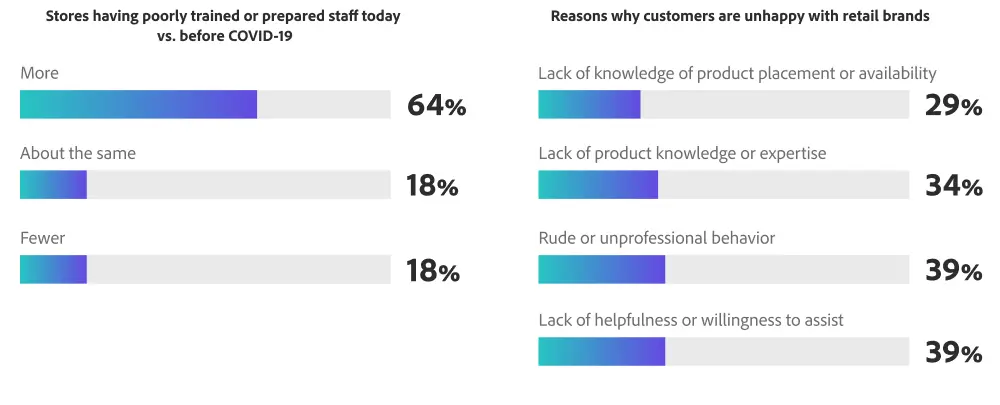
Let's review how traditional LMS platforms are failing retail teams and how you can overcome their drawbacks.
Drawbacks of traditional LMSs in a retail learning environment
Traditional retail LMSs don’t live up to the mark anymore. These legacy systems don’t cater to the needs of retail workers and fit into their day-to-day activities.
Here are a few challenges retail teams deal with every day:
Challenge #1: Frontline workers are strapped for time
Every minute on the sales floor counts. But frontline workers have way too much on their plates these days. Whether it's providing excellent customer service or managing inventory, there's a lot to do, which turns training into an afterthought.
On the other hand, traditional LMSs live in a parallel universe that caters to employees who have the luxury of time. These systems limit your training to 30 to 60-minute live presentations or hours-long eLearning modules for which no one has the time.
Next thing you know, store managers either have to pull workers off the sales floor or schedule training during slower periods. In some cases, workers are encouraged to take training back home to get up to speed, leading to unpaid labor and burnout.
The fact remains: we need better systems to enable frontline workers.
Challenge #2: Your LMS isn’t flexible or accessible
Most LMSs are built keeping a specific user in mind. You know, the desk-bound employee with reliable access to a computer and the internet at all times.
That's not the case with frontline workers. They're always on the run, catering to multiple customers at a time in some cases. They need a tool that delivers retail training on the go without needing reliable internet.
Also, even if they're sitting in the stockroom or backroom trying to absorb as much information as possible during their breaks, the LMS must work with a shoddy internet connection. If you've used a legacy system, you know that couldn't be further from the truth.
Tiffany Chan Liban, our VP of Customer Success and resident retail expert, also points out that these systems don't incorporate on-the-job activities, which are relatively more effective.
For example, you could pair a new job aide with new denim/jeans styles that were recently released, along with a try-on session where employees try on the latest jeans and add their "review" in the app. But that's not possible with traditional presentation formats.
Challenge #3: Your LMS doesn’t account for learning styles
There's no one-size-fits-all approach to training frontline workers. They usually come from:
- Different generations
- Different educational backgrounds
- Different level of tech savviness
Also, they might have different learning preferences. For example, a Gen-Z individual might be more attuned to short video-based learning, so they won’t retain much from an hour-long presentation.
That's why you need to go beyond traditional training methods to make an actual difference. For reference, here are some ways companies delivered training in 2023. Instructor-led learning represents barely a fifth of these sessions:
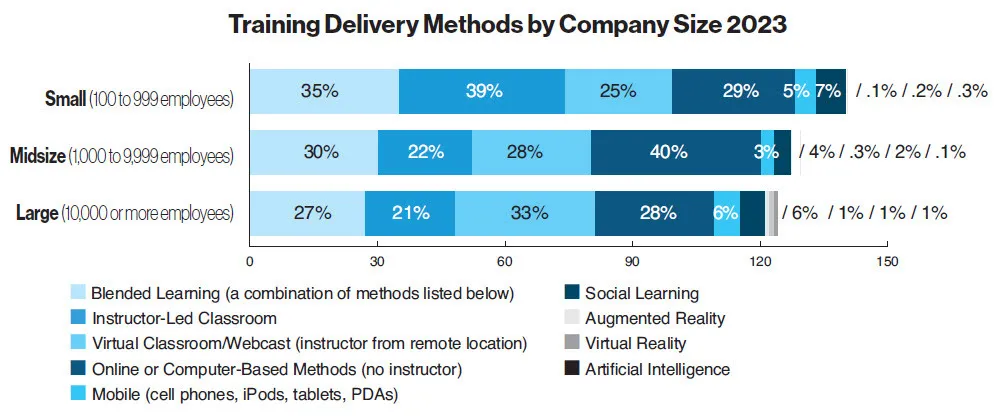
Challenge #4: Nobody has visibility into training or its impact
While many LMS platforms offer analytics, it’s relatively uncommon to find platforms that actually quantify learning effectiveness for in-store workers. They don’t have a way to measure if the training sessions make an actual difference in performance.
In some cases, even the compliance checklist is treated like a checkbox activity, so you don’t know if employees paid attention or not.
When you're switching LMS providers, search for one that offers robust digital training capabilities that are actually trackable in the software like:
- Short training modules
- Interactive formats (like augmented reality)
- Customizable onboarding
- Offline access to materials
- Roleplaying or coaching tools
This way, you'll get a more holistic view of an employee's training sessions and make better decisions on the effectiveness of the program.
Challenge #5: Your learning content isn’t practical enough
In 2023, employee attraction and retention were still some of the biggest problems in the retail sector. As more employees want a full-fledged career instead of a job that just pays the bills, you need to offer incentives to keep them engaged and show that you care.
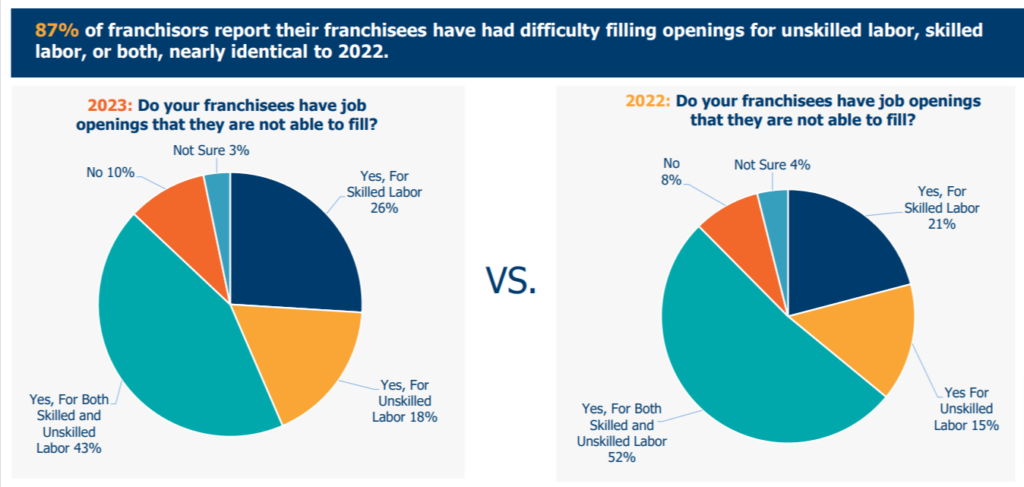
Source (and note that we don’t believe in such a thing as “unskilled labor”)
You can do that by helping them get better at (and therefore have a better experience performing) their roles. Traditional LMSs can't offer training in a way that employees need. For example, it's too theoretical, and that becomes apparent when they're on the sales floor trying to handle a difficult customer or managing seasonal rushes.
As new products launch, promotions change, or procedures update, the content update process is also quite slow because you have to build these elaborate modules. You need to deliver shorter training that frontline workers can use during an interaction — and even get coaching assistance on the go.
Challenge #6: Your LMS isn’t deployable on different devices or offline
Another drawback is that legacy systems were designed for desktop devices only. Even if they have mobile apps, the data doesn't sync well, and the training isn't optimized for such a device.
This limitation becomes particularly problematic in retail settings where:
- Workers don't have consistent access to desktop computers
- Training needs to happen on the sales floor
- Quick reference materials need to be accessed during customer interactions
- Learning needs to occur during short breaks or quiet periods
- Internet is patchy
- Multiple employees need to access training simultaneously
As a result, the user experience is compromised because the content doesn't display correctly, videos don't load, or interfaces are difficult to navigate. The system that was meant to support your workers fails them miserably.
Challenge #7: Managers themselves don’t have the right tools to provide training
Store managers play a huge role in developing the skills of their direct reports. That said, there’s only so much time and resources they have in hand to help them do that.
Here’s how it limits their ability to offer training:
- Difficulty in assigning and tracking training for specific individuals or groups
- Limited ability to schedule training around store operations
- Lack of flexibility in adjusting training paths based on individual employee needs
- Inability to effectively connect training completion with on-floor performance
- Poor tools for monitoring training progress and completion
For instance, updating content on the fly is challenging if you're using a legacy system since the formats or editing capabilities are limited. This means employees continue to access out-of-date materials, which impacts performance.
How do you modernize your retail training processes?
Now that you know how your LMS might be holding your retail workers from doing their best, let’s look at how you can change that:
1. Challenge the status quo first
As cliche as it sounds, the change starts from the top. If you've already felt the symptoms of an outdated LMS, it's time to look for painkillers for the problem.
Start by thinking outside the box and shaking things up within your organization. "A lot of retail training is rooted in long-term processes that have existed for a long time,” says Liban. "Think about the end-user experience first and foremost. Always test how this will work in real life & for actual frontline workers who are going to be surrounded by a myriad of distractions (tasks to do to open the store, customers coming into the store, etc.)."
Review your current training systems and methodologies and talk to your employees. Where is the process breaking down? That’s how you know what you need to prioritize in your next LMS.
Consumers love brands that are digitally innovative — and that’s not limited to the customer experience only. Unless your employees feel like they’re being supported enough, it won’t trickle through the final customer experience.
2. Adopt mobile-first training systems
Training Industry Report 2023 shows that only 4% of training hours were delivered through mobile devices. But when retail workers are constantly on the move, it indicates a massive gap in understanding how and where they'd prefer to learn.
You need to start working with systems that allow your employees to learn on the go — and in an offline setting. For example, Bigtincan’s LMS lets employees access interactive training materials irrespective of whether they have a good internet connection. This way, they can find the right materials during a sales conversation.
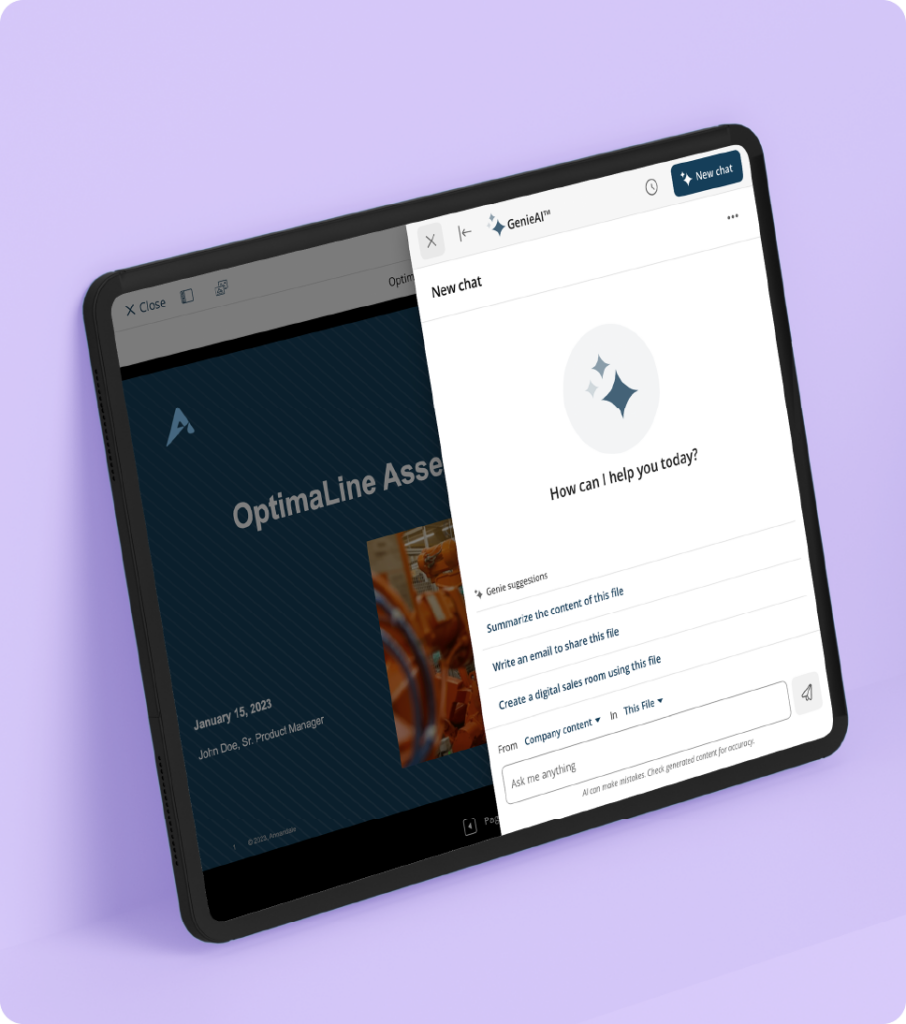
It also makes training a continuous activity as opposed to a one-time thing. Instead of spending a few hours each year upskilling or reskilling, it’s embedded into their everyday activities.
3. Curate training experiences specific to your stores
Distractions are the norm. That’s why you need to create training sessions that account for these issues in the long run.
Design your retail training sessions to consider the reality of your employees' busy, unpredictable days. For example, when Liban worked at GUESS, her team offered on-the-floor training instead (via Bigtincan 😉). Since training could be done on the iPad, it was a big shift because previous training would have to happen in the back room or stock area for the most part.
Similarly, you can offer on-the-floor training or microlearning sessions where employees can get up to speed as and when they need to know the information. But before you roll it out completely, consider running a pilot program and getting feedback from store managers and frontline workers. You’ll prevent any adoption issues later on and can tweak the program to their needs.
4. Use short-burst training sessions
Nobody wants to sit through yet another 60-minute presentation. In fact, it’s counterintuitive as human beings don’t tend to retain information easily anyway. According to Ebbighaus’ Forgetting Curve, we forget 50% of the things we learn within a day — and 90% within a week. In short, you need to change the way you deliver training to increase retention.
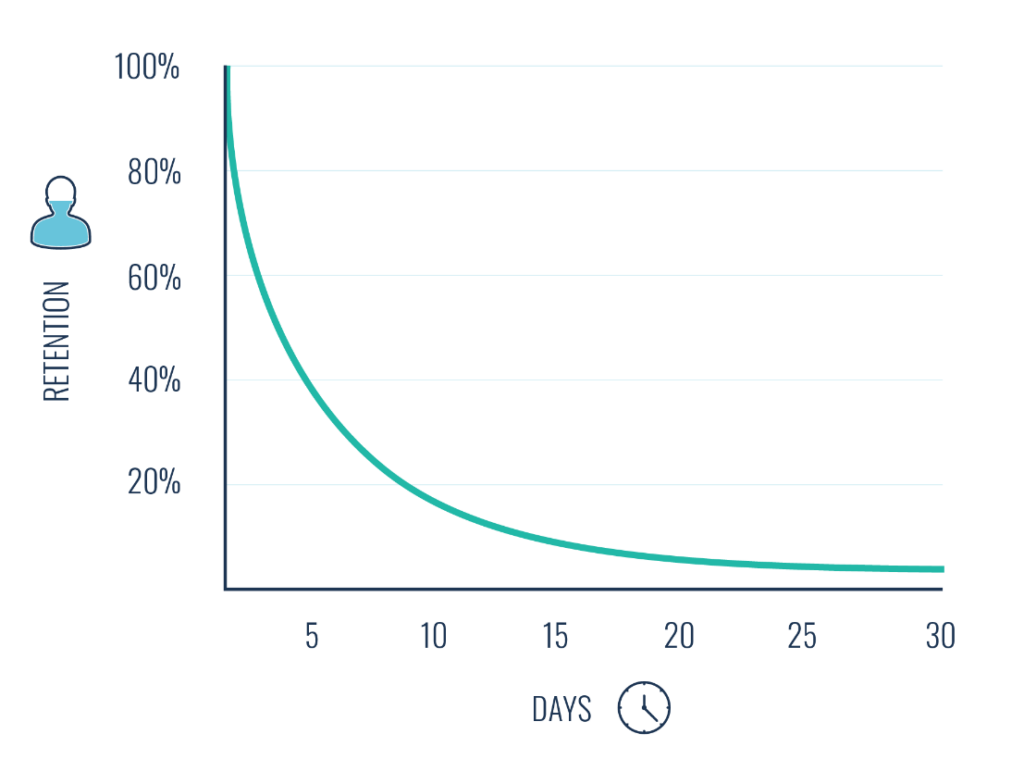
You can achieve this by using microlearning techniques. You break down complex topics into digestible chunks that employees can complete in five to ten minutes. It makes the process more manageable and also encourages continuous learning.
Instead of a long presentation, create a short module with the necessary details. Let's say you've launched a new product. Give employees access to the product details with examples of how to sell it. Or you could do a short roleplaying activity within your LMS with your manager's help.
5. Implement seasonal training cycles
Another issue with retail training is that a lot of the sales process is seasonal. So, frontline workers have to be in the know constantly — but that also means they need the right resources in place to achieve that.
As training is considered a “non-productive hour,” use systems that minimize time spent while making the right training modules available in the right seasons.
You can even use a compliance checklist to verify every worker has taken the training, and managers can use the analytics to see where employees are excelling or falling short. So, choose an LMS or alternative that offers these capabilities.
Choose a training LMS that truly supports your frontline workers
It's time to adopt a more modern and agile approach to training. While traditional LMS platforms have rigid structures that don't fit your needs, continuing on the same path risks your bottom line.
Your retail organization deserves an approach that:
- Recognizes the mobile nature of retail work
- Supports learning in the flow of work
- Adapts to store-specific needs
- Enables quick knowledge access
- Allows for continuous skill development
- Gives managers the tools to guide their teams
The only way to do that is to invest in an LMS platform that offers these capabilities. If you’re interested in learning more about how Bigtincan facilitates all that (and more), schedule a demo today.
